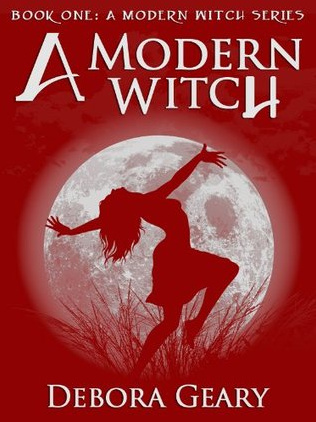

“Seeing the future sounds cool until you get this two-second flash and have no idea what it means, or if it will really happen.”
― Debora Geary, quote from A Modern Witch
“I wasn’t a witch until last Wednesday,” Lauren said. “I don’t know how to handle this.” “You’ve always been a witch, sweetheart. You just didn’t know.”
― Debora Geary, quote from A Modern Witch
“Friends who can accept you, even when the rules change like that, are gold.”
― Debora Geary, quote from A Modern Witch
“the best conversations wandered and twisted around. Sometimes you learn more that way than traveling in straight lines. ”
― Debora Geary, quote from A Modern Witch
“Nat gave her a lopsided grin. “Something like that.” “This is one weird February.”
― Debora Geary, quote from A Modern Witch

“She yanked open the door of the bagel shop and gratefully charged inside. Her mind reeled. Too many voices, too many feelings, too much. Lauren felt her stomach churning and clutched the door handle. She focused on the handle. That was the way out. The three steps to carry her back out the door were a marathon. When the door closed, she sank to her knees.”
― Debora Geary, quote from A Modern Witch
“ “I’m pretty sure if it weren’t for you, I’d have spent the rest of my life terrified of crowded places. I can’t thank you enough.”
― Debora Geary, quote from A Modern Witch
“In theory, a coven is just a group of witches working together.” Jamie looked pained. “In practice?” “In practice, it tends to be really heavy on ritual, really light on actual magic.”
― Debora Geary, quote from A Modern Witch
“It’s because I’m a witch that I can take these pictures,” Jennie said. “A good portrait photographer shows the outside of a person; a great one shows the inside. Being a mind witch makes it a little easier to see the inside, to know what the photograph needs to show.”
― Debora Geary, quote from A Modern Witch
“As instructed, she visualized the first moves in her mind, and then began. No words—her class was supposed to be reading the pictures in her mind. Knees bend, arms sweep up, breathe in. Stretch for the gorgeous blue sky and feel the warmth. Breathe out, arms sweep down and to heart center. Repeat.”
― Debora Geary, quote from A Modern Witch

“I have new batteries in the iPod, so she can have her own personal force field back. ”
― Debora Geary, quote from A Modern Witch
“The windows,
the starving windows
that drive the trees like nails into my heart.”
― Anne Sexton, quote from The Awful Rowing Toward God
“The more we sense...our ultimate potential, the more determined we become to achieve it. It's the difference between your mother hounding you to practice the piano and reaching the point where you want to do it yourself. You simply will not be denied the ultimate reward and the joy of the Big Finish. p 90”
― Sheri Dew, quote from No Doubt About It
“IT’S so WRONG, so profoundly wrong, for a child to die before its parents. It’s hard enough to bury our parents. But that we expect. Our parents belong to our past, our children belong to our future. We do not visualize our future without them. How can I bury my son, my future, one of the next in line? He was meant to bury me!”
― Nicholas Wolterstorff, quote from Lament for a Son
“I chuckled like Aldo Ray. If I had to endure his l'homme du monde act, he had to suffer my jaded alcoholic private eye.”
― James Crumley, quote from The Last Good Kiss
“Vorsichtshalber haben sie das Etikett 'Kapitalismus' ersetzt durch solche, auf denen 'freie Marktwirtschaft' und 'Konsumkultur' steht, nur roch das immer noch zu sehr nach Hund-frisst-Hund, nach allzu vielen Verlierern und maßlos abrahmenden Gewinnern. Wenn man die Hunde aber isch nicht miteinander balgen lässt, dann liegen sie den ganzen Tag im Zwinger und pennen. Im Grund besteht das Problem darin, dass die Gesellschaft anständig zu sein versucht, und mit Anstand ist gegen die menschliche Natur nichts auszurichten. Nicht das Geringste. Wir sollten alle wieder Jäger und Sammler werden, dann hätten wir eine hundertprozentige Beschäftigungsquote und ein gesundes Magenknurren.”
― John Updike, quote from Terrorist
BookQuoters is a community of passionate readers who enjoy sharing the most meaningful, memorable and interesting quotes from great books. As the world communicates more and more via texts, memes and sound bytes, short but profound quotes from books have become more relevant and important. For some of us a quote becomes a mantra, a goal or a philosophy by which we live. For all of us, quotes are a great way to remember a book and to carry with us the author’s best ideas.
We thoughtfully gather quotes from our favorite books, both classic and current, and choose the ones that are most thought-provoking. Each quote represents a book that is interesting, well written and has potential to enhance the reader’s life. We also accept submissions from our visitors and will select the quotes we feel are most appealing to the BookQuoters community.
Founded in 2023, BookQuoters has quickly become a large and vibrant community of people who share an affinity for books. Books are seen by some as a throwback to a previous world; conversely, gleaning the main ideas of a book via a quote or a quick summary is typical of the Information Age but is a habit disdained by some diehard readers. We feel that we have the best of both worlds at BookQuoters; we read books cover-to-cover but offer you some of the highlights. We hope you’ll join us.